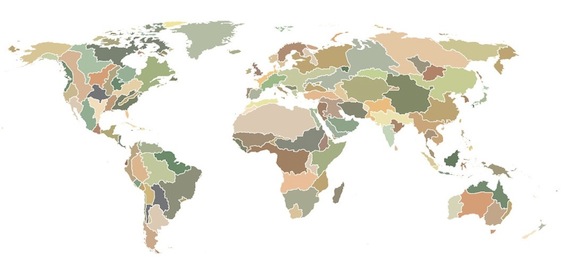 I’ve listened to last week’s talks by political economist Gar Alperovitz several times (videos from Seattle and San Francisco), and one piece that caught my attention was his case for regionalism.
I’ve listened to last week’s talks by political economist Gar Alperovitz several times (videos from Seattle and San Francisco), and one piece that caught my attention was his case for regionalism.
As expressed here (~1:00:40 into the Seattle talk), Gar’s main concern is the challenge of engendering political participation across vast geographic scales and growing populations:
One of the things i didn’t mention, which is built into the logic of how I think about it. …
This is a society of 318 million. The Census Bureau high projection for the rest of this century is one billion. That’s the high projection, but 500 to 600 to 700 million is well within the possibility.
This is a continental-scale system. We don’t often realize how big it is. We make comparisons with European countries — [but] you can tuck Germany into Montana. …
So you tell me how you have participatory democracy in a continental system of 700 or 800 million people. Inevitably there is going to be decentralization in the next system — and most states are too small, and the continent is too big, which probably means regional restructuring of some kind. …
What would it mean if we were serious about designing a system that took the scale issue and democracy seriously? It would have to be decentralized.
In what ways does spatial scale matter? Smaller geographic scales offer greater opportunities for legitimate political participation. Absolutely.
In the Ecotrust publication “Resilience & Transformation: A Regional Approach,” we considered the question of scale in terms of bolstering resilience. Here are the broad benefits we considered:
To describe some of the ways in which regional economies can bolster resilience, we posit the following:
• Diversity within and among regions reduces vulnerability to stresses and shocks from climate change, disease, shortages, transmission or transport failures, and so on.
• A greater diversity of production systems within and among regions offers greater opportunities for ownership, community investment, and social capital formation.
• Regional trade networks offer opportunities for more immediate and transparent feedback about the true costs of production and consumption.
• Regional trade networks offer opportunities for shared responsibility, stewardship, and community.
• Especially when national and international institutions prove rigid and inflexible, the emergence of novelty and innovation at local and regional scales can be critical to leadership on global problems such as climate change.
Resilience Regions map by Ecotrust

